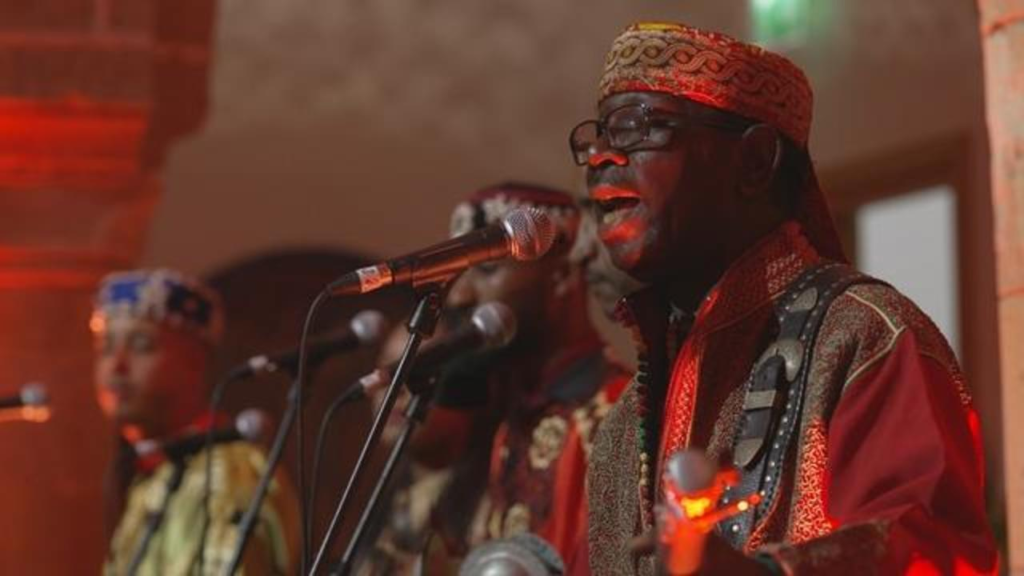The Resonance Of Moroccan Blues: Gnawa Music’s Journey From The Ancient Past To The Global Stage
Most people are unfamiliar with Gnawa, a genre originally shrouded in secrecy. The music traces its origins to enslaved Black Africans in Morocco, where it was exclusively played in clandestine ceremonies for centuries. Gnawa, meaning “black people” in the indigenous language, is a musical testament to the suffering of slavery. Interestingly, the rhythms embedded in Gnawa resonate with many African Americans, as they are a crucial part of the evolution of American Blues, emerging from a blend of ancient African and Islamic rituals.
The Global Resurgence: From Essaouira to the World

In contemporary times, Gnawa is experiencing a surge in popularity, drawing hundreds of thousands of music enthusiasts worldwide. The epicenter of this revival is the annual Gnawa and World Music Festival held in Essaouira on Morocco’s Atlantic coast, attracting 480 musicians from 16 countries to perform in 50 concerts.
Essence of Gnawa: A Glimpse into the Festival
At the heart of Essaouira, as the sun sets, the anticipation builds for maalem Hamid El Kasri, a 21st-century Gnawa superstar. Accompanied by backup singers adorned in traditional attire, El Kasri’s performance with the iconic gimbri, a bass instrument made from wood, camel skin, and goat gut, weaves a musical tapestry with Arabic lyrics dating back to the Middle Ages.
Unraveling the Musical Threads: Connecting Gnawa to American Blues
The rhythmic crescendo of Gnawa, driven by the krakebs (metal castanets), unveils the profound influence this ancient music has on the roots of American Blues. Actor and Gnawa enthusiast Robert Wisdom draws parallels, tracing the blues back to Black cultures in Senegal, Gambia, and Mali, emphasizing the profound connection between Gnawa and the American Blues.
Essaouira’s Festival: A Portal to Identity and Africanness
The festival in Essaouira has evolved from a niche following in 1998 to attracting half a million fans, including Western musicians seeking the essence of Moroccan blues. Bob Wisdom describes Essaouira as a living reminder of identity, emphasizing the music’s ability to connect with the past and evoke the Africanness in the blood of its listeners.
Castanets: The Heartbeat of Gnawa
Sulaiman Hakim, a seasoned American percussionist, underscores the significance of castanets in Gnawa music, describing their unique pulsation. He draws parallels between the call-and-response in Gnawa and the musical traditions he grew up with in Los Angeles, emphasizing the shared elements with blues and funk.
Gnawa’s Impact on Western Musicians
Morocco has captivated the hearts of Western musicians, with legends like Randy Weston, Robert Plant, Carlos Santana, Cat Stevens, Paul Simon, and even Madonna finding inspiration in Gnawa. Jimi Hendrix’s legendary encounter with Gnawa in 1969 continues to echo through Essaouira, solidifying the town’s reputation as a musical haven.
Gnawa’s Healing Power: A Scientific Perspective
The profound healing power of Gnawa is gaining attention in scientific circles. The music, originating from the enslaved Black Africans transported to Morocco centuries ago, is now being studied for its therapeutic potential. The lilas, private Gnawa trance ceremonies, serve as musical rituals to communicate with spirits and cure various ailments.
Future Prospects: Gnawa’s Evolution and Global Impact
As Gnawa continues to inspire Moroccan bands and gain rock star status, its annual festival in Essaouira remains a focal point. With the likes of Hoba Hoba Spirit embodying the essence of Gnawa in contemporary rock ‘n’ roll, the ancient music is poised to influence generations to come. Musicians like Sulaiman Hakim predict a transformative impact on the global music scene, ensuring that Gnawa is here to stay.
Get The Latest Updates From The World Of Music, Movies, TV, Culture, And Fashion In Musical States Magazine. Please Follow Us On Facebook, Instagram, Twitter, And LinkedIn To Receive Instantaneous Updates



